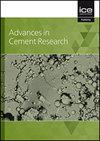偏高岭土和煅烧粘土混合水泥对混凝土抗氯性和电阻率的影响
IF 1.3
4区 工程技术
Q3 CONSTRUCTION & BUILDING TECHNOLOGY
引用次数: 0
摘要
全世界有许多不同等级的高岭石粘土。在不同地区,低品位高岭石粘土比高品位高岭石粘土更为丰富。为了利用原始高岭石含量约为 40% 的低品位高岭土生产煅烧粘土,本文研究了使用高品位高岭土或高岭石含量高的煅烧粘土(市售偏高岭土或 CC1)和使用低品位高岭土(CC2)生产的煅烧粘土制成的混凝土的耐久性能。混凝土混合物的水胶比设计为 0.60。研究了粉煤灰与粘结剂的比率为 0.20,煅烧高岭土与粘结剂的比率为 0.10 和 0.20。对混凝土的抗氯化物渗透性和电阻率进行了评估,并利用汞侵入孔隙模拟法(MIP)评估了混凝土的孔隙结构。测试结果表明,与 OPC 和 FA20 混凝土相比,CC1 和 CC2 混凝土的抗氯化物渗透能力和氯化物结合能力更强。此外,使用较高的煅烧粘土与粘结剂之比会使孔隙结构更加细化,从而显著提高混凝土的抗氯化物能力。虽然 CC2 在提高抗氯化物性能方面不如 CC1,但与粉煤灰相比,它的性能更优越。本文章由计算机程序翻译,如有差异,请以英文原文为准。
Influences of metakaolin and calcined clay blended cement on chloride resistance and electrical resistivity of concrete
There are many different grades of kaolinite clays around the world. Low-grade kaolinite clay is more abundant than high-grade kaolinite clay in various regions. To aim toward the utilization of low-grade kaolinite clay having an original kaolinite content of about 40% to produce calcined clay, this paper investigated the durability properties of concrete incorporating calcined clay produced from high-grade kaolinite clay or high kaolinite content (commercially available metakaolin or CC1) and calcined clay produced from a low-grade kaolinite clay (CC2). Concrete mixtures were designed to have a water-to-binder ratio of 0.60. A fly ash-to-binder ratio of 0.20 and calcined kaolinite clay-to-binder ratios of 0.10 and 0.20 were studied. The chloride penetration resistance and the electrical resistivity of concrete were assessed, while the mercury intrusion porosimetry (MIP) was utilized in evaluating the pore structure of concrete. The test results revealed that concrete with CC1 and CC2 exhibited superior chloride penetration resistance and chloride binding capacity than OPC and FA20 concretes. Moreover, using a higher calcined clay-to-binder ratio resulted in a more refined pore structure, which significantly enhanced the chloride resistance of concrete. Although CC2 revealed less performance in improving chloride resistance than CC1, it had superior performance compared to fly ash.
求助全文
通过发布文献求助,成功后即可免费获取论文全文。
去求助
来源期刊

Advances in Cement Research
工程技术-材料科学:综合
CiteScore
3.70
自引率
5.00%
发文量
56
审稿时长
3.2 months
期刊介绍:
Advances in Cement Research highlights the scientific ideas and innovations within the cutting-edge cement manufacture industry. It is a global journal with a scope encompassing cement manufacture and materials, properties and durability of cementitious materials and systems, hydration, interaction of cement with other materials, analysis and testing, special cements and applications.
 求助内容:
求助内容: 应助结果提醒方式:
应助结果提醒方式:


